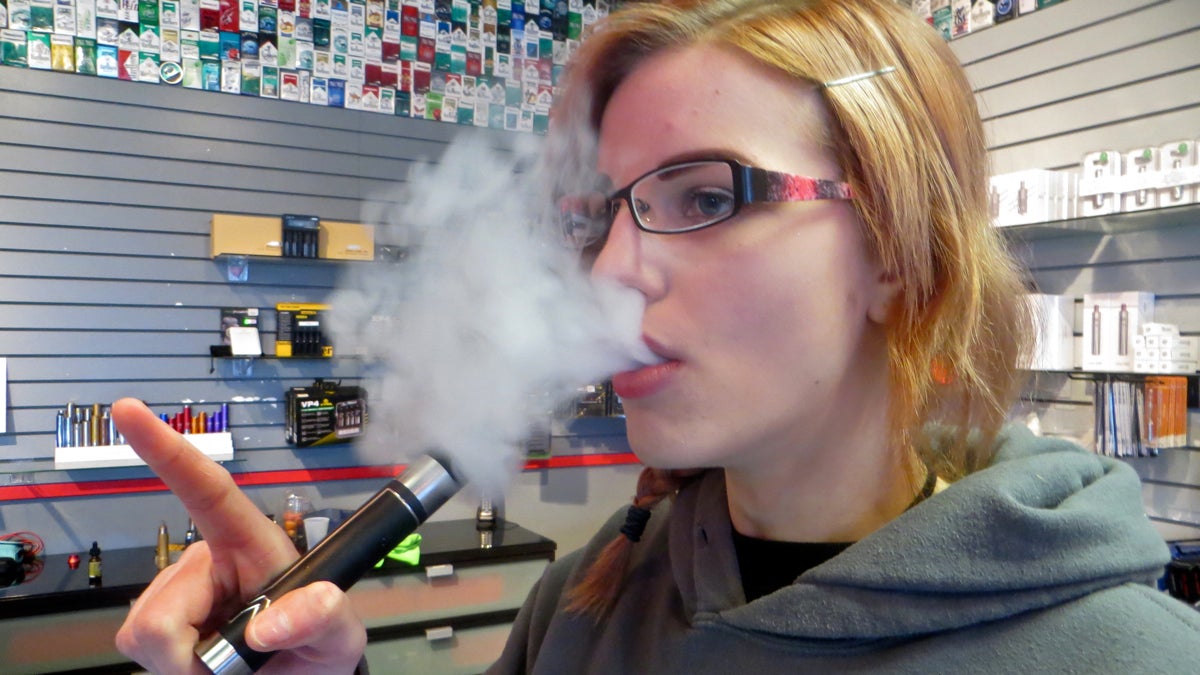Delaware law restricting vaping takes hold

Delaware Vapor assistant manager Emily Skelton, 20, says she started smoking combustible cigarettes at age 12. Now she's been vaping for a year. (Taunya English/WHYY)
Beginning in October, vapers in Delaware won’t be allowed to fire up their electronic cigarettes inside public spaces such as shopping malls, bars, restaurants and bowling alleys.
Supporters say the new law was written to clear the air and prevent nicotine vapors from hurting bystanders.
But vapers will be able to puff in stores that sell electronic cigarettes.
“We offer a try before you buy,” said Scott Nizborski, who own Vape Escape stores in Wilmington and Newark, Delaware.
“We have a tasting bar where you can sample all of our e-liquid before you make a decision which one to purchase, and so that requires that you vape here in the store,” he said.
The Delaware rule lets shoppers test out the devices that deliver nicotine, but children are banned from those vape shops.
“We never allowed anyone in the shop under 18 unless they were escorted by a parent anyway, so that’s really nothing new,” Nizborski said.
Under the law signed by Gov. Jack Markell, if vapers are allowed to light up in the shop, children cannot enter.
Nizborski is disappointed that Delaware is implementing rules while federal health officials seem to be waiting for more research on potential health benefits and risks.
“I think the federal government is starting to recognize the deluge of reports that are starting to come out. They’re starting to lean toward recognizing vaping as a smoking-cessation device,” Nizborski said.
He and other shop owners say they believe health studies that show there’s no harm to air quality from vaping.
The Food and Drug Administration was set to make rules for electronic cigarettes this summer but missed that deadline.
A study published online in JAMA Pediatrics found that young people who vape are more likely smoke combustible cigarettes a year later.
Family physician Brian Primack from the University of Pittsburgh Center for Research on Media, Technology, and Health led the study. His team surveyed about 700 people from 16 to 26.
At the start of the study all participants said they were not interested in smoking tobacco cigarettes. When the investigators checked back a year later, 38 percent of e-cig users in the group had gone on to smoke regular cigarettes.
“However among the people that were not vapers at the beginning of the study, only 10 percent went on to smoke cigarettes,” Primack said.
“It does seem to show that people that use e-cigarettes — even if they are not intending on smoking — often do progress to smoking. We need to think more carefully about exactly why this is,” he said.
Primack and other researcher have theories, but no researched answers yet. Maybe electronic cigarettes are a gateway to tobacco smoking?
“So it’s sort of perfect starter cigarette, a new user can start with an e-cigarette and then progress to regular cigarettes when they need more nicotine,” he said.
Another possibility is that social pressures change as young people age. Primack said perhaps the appeal of fruity flavors and novel technology wanes for young adults.
“People make fun of them for needing that blueberry nonsense, ‘you should really smoke a real cigarette,’ it’s sort of potentially analogous to kids who drink wine coolers as teenagers and then they progress to shots of tequila or whiskey later on,” he said.
The University of Pittsburgh study joins a growing body of research on electronic cigarettes.
Last week, the journal “Cancer Prevention Research” released a study that suggests that smokers who switch from conventional tobacco cigarettes to electronic cigarettes are exposed to less of two toxins that are found in tobacco and e-cigarette vapor.
Health researchers in the United Kingdom conducted the four-week study of 40 adults.
WHYY is your source for fact-based, in-depth journalism and information. As a nonprofit organization, we rely on financial support from readers like you. Please give today.

